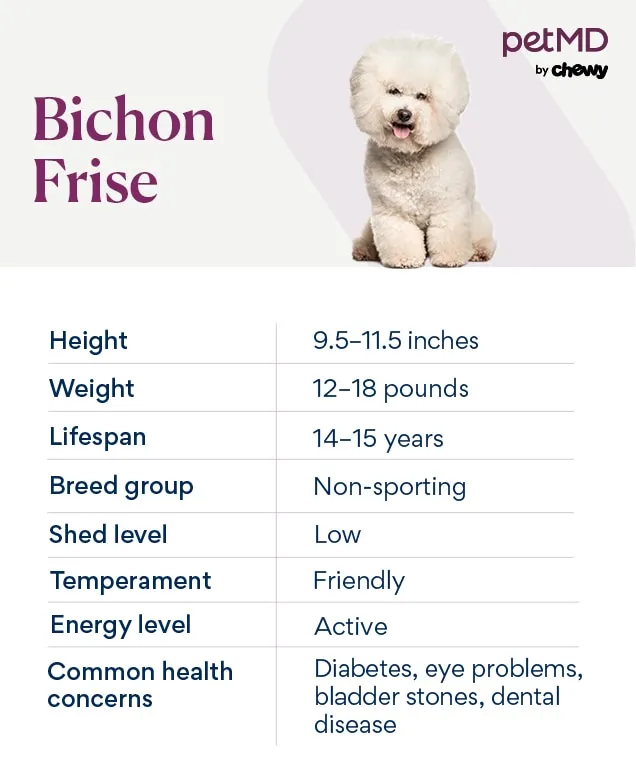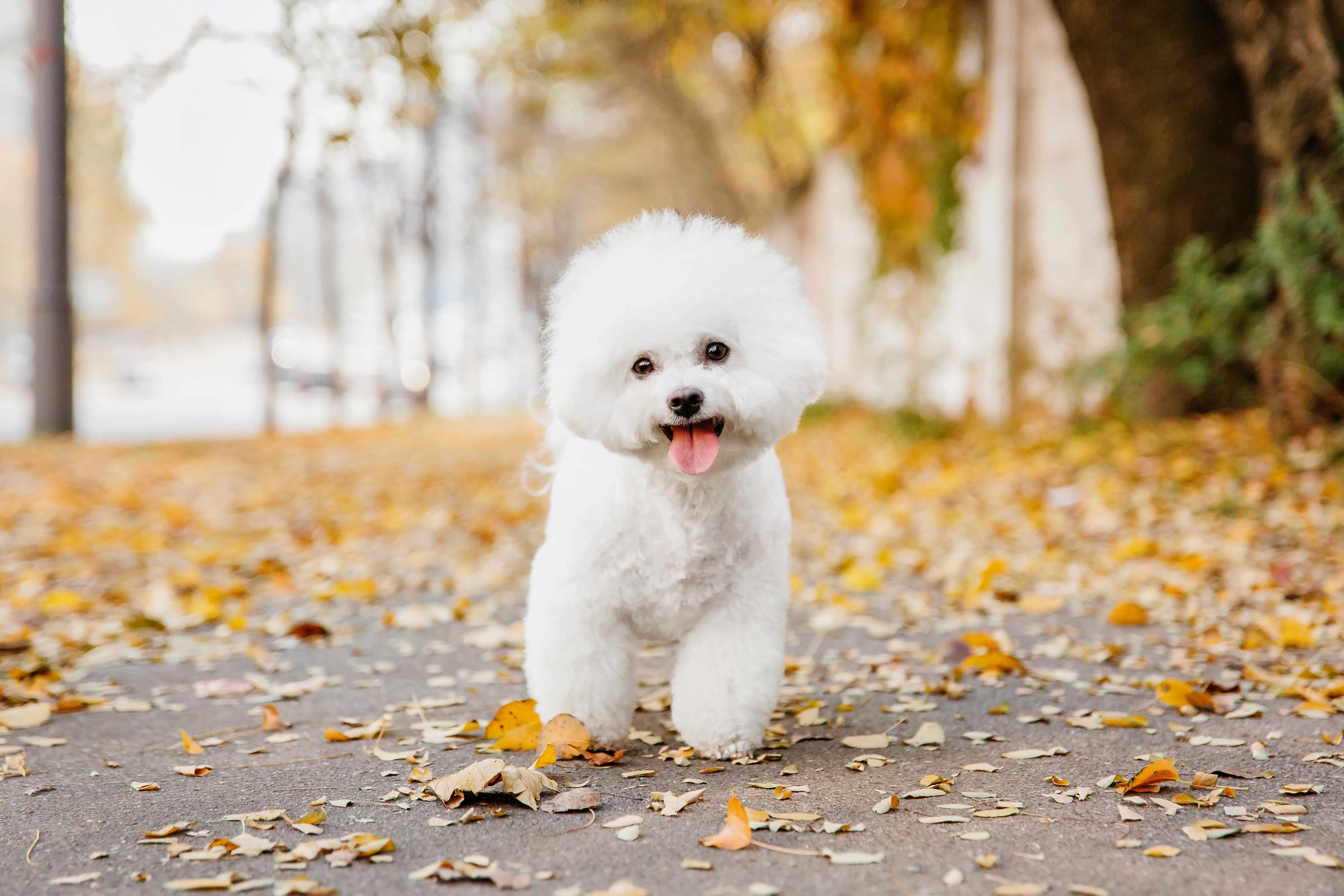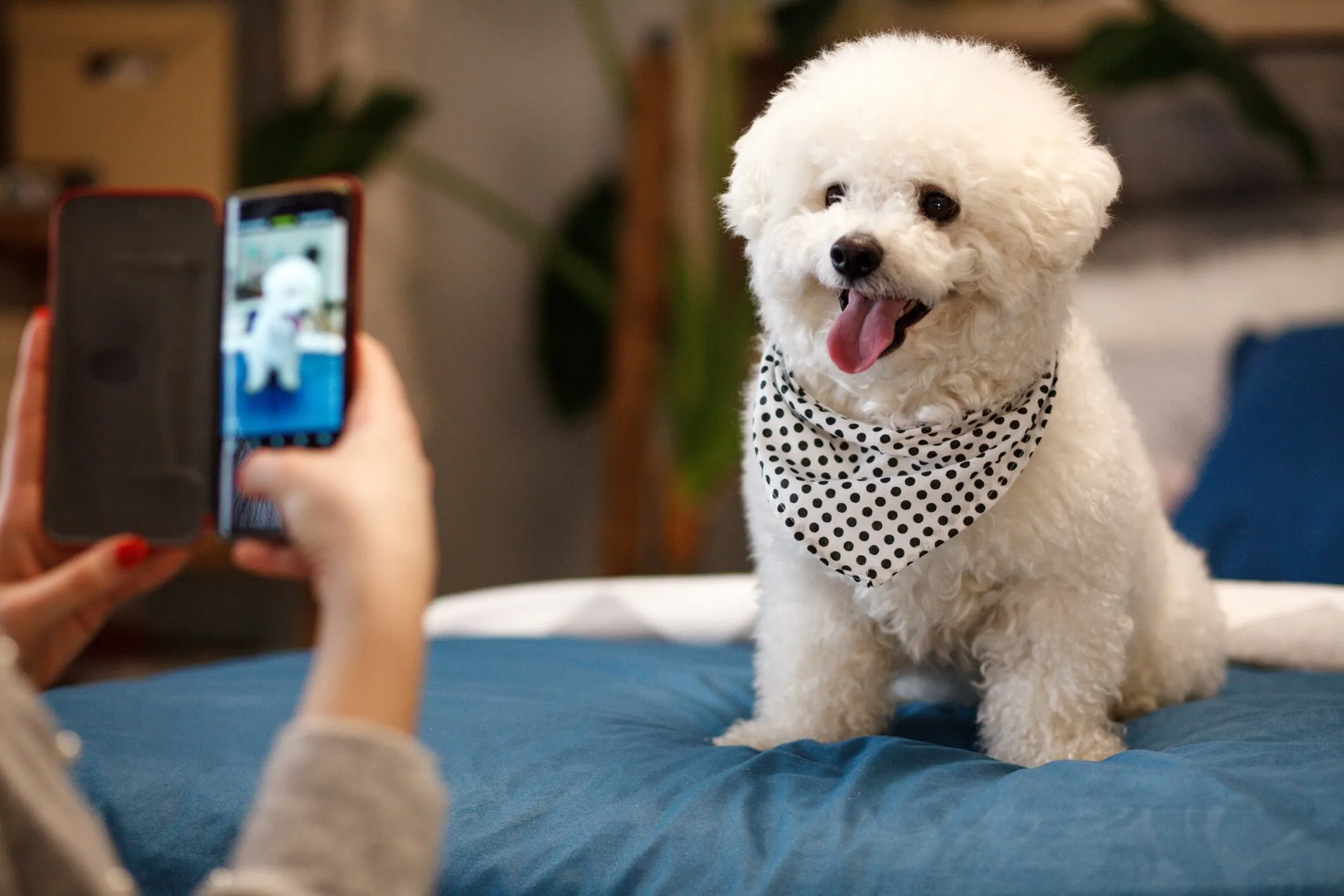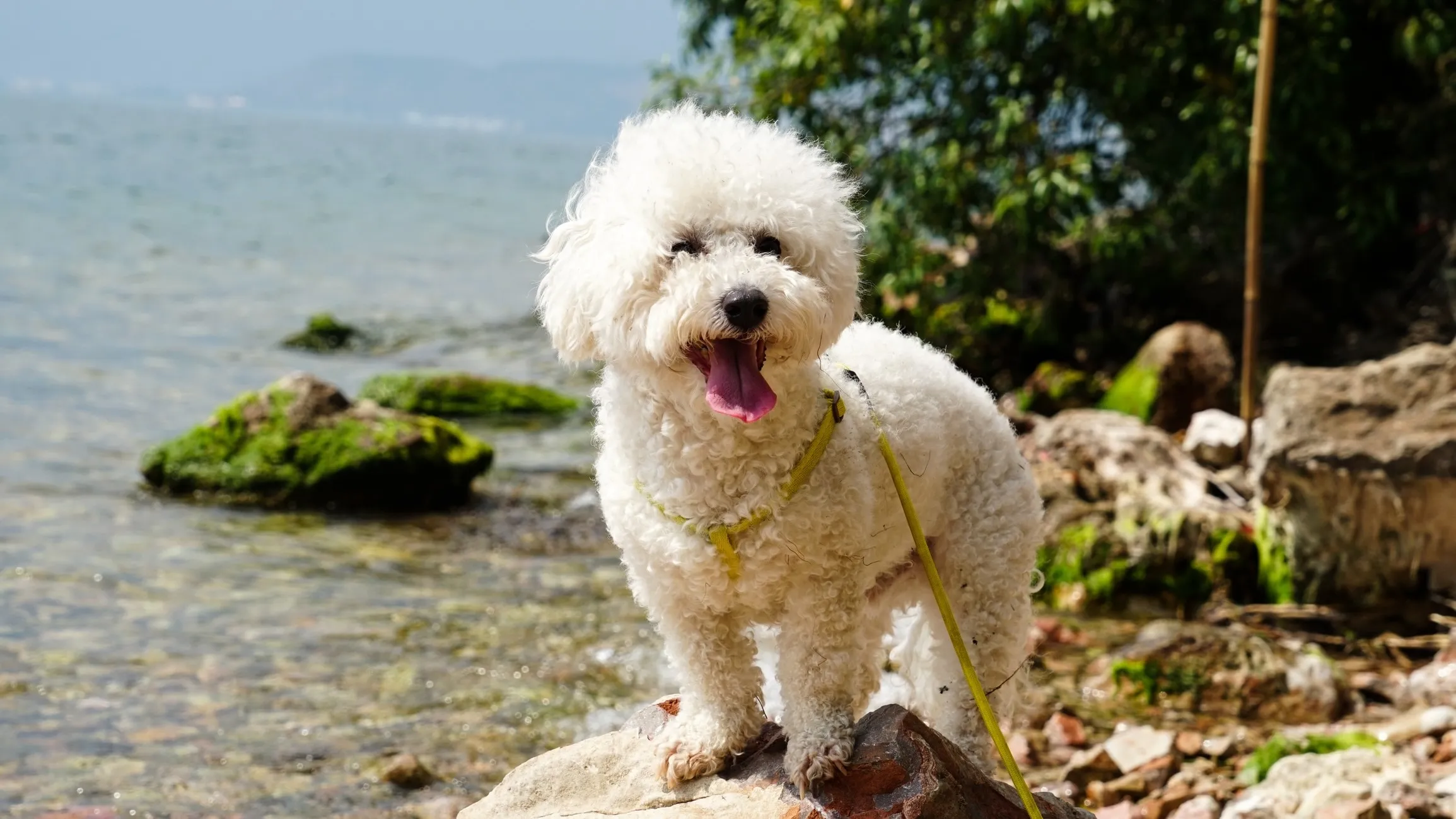The charming Bichon Frise, with its playful spirit and cloud-like white coat, is a beloved companion for many. While their vibrant personality brings immense joy, ensuring their health and well-being largely depends on a proper diet. As responsible pet parents, understanding what these delightful small dogs can eat and, critically, What Can Bichon Frise Not Eat is paramount to preventing illness and promoting a long, happy life. This guide will delve into the essential dietary knowledge every Bichon Frise owner needs, from everyday nutrition to specific foods that pose serious health risks.
Understanding the Bichon Frise: A Brief Overview
Bichon Frise dogs are affectionate and curious members of the non-sporting group, known for their adaptability and friendly nature. Standing just under a foot tall and typically weighing 12–18 pounds, they are excellent apartment dwellers and often considered suitable for first-time pet parents. Their minimal shedding also makes them a popular choice for some individuals with dog allergies, although no dog is entirely “hypoallergenic.” Social by nature, Bichons thrive on interaction and playtime, eager to please their human companions.
However, their small stature and specific genetic predispositions mean their diet requires careful consideration to maintain optimal health throughout their 14–15 year lifespan.
The Critical Question: What Can Bichon Frise Not Eat?
When it comes to feeding your Bichon Frise, vigilance is key. Many common human foods can be highly toxic or harmful to dogs, and due to their smaller size, even a small amount can have severe consequences for a Bichon. Knowing what can Bichon Frise not eat is crucial for their safety and well-being.
Common Toxic Foods to Strictly Avoid
The following foods should never be given to your Bichon Frise, as they contain substances that can cause serious illness, organ damage, or even be fatal.
- Chocolate, Coffee, Tea, and Caffeine: These contain methylxanthines like theobromine and caffeine, which dogs process very slowly. Ingesting them can lead to vomiting, diarrhea, tremors, seizures, heart problems, and, in severe cases, death. Dark chocolate and baking chocolate are particularly dangerous.
- Grapes, Raisins, and Currants: The exact toxic agent is unknown, but these fruits can cause acute kidney failure in dogs, even in small quantities. Symptoms can appear within 24 hours and include vomiting, diarrhea, excessive thirst and urination, and abdominal pain.
- Onions, Garlic, Chives, and Leeks: Members of the Allium family, these vegetables contain organosulfoxides that can damage red blood cells, leading to anemia. This can occur whether they are raw, cooked, or powdered. Symptoms might be delayed by a few days.
- Xylitol (Artificial Sweetener): Found in many sugar-free products like gum, candies, baked goods, and some peanut butter brands, xylitol is highly toxic. It can cause a rapid and severe drop in blood sugar (hypoglycemia) and liver failure. Always check peanut butter labels before offering it as a treat.
- Avocado: Avocados contain persin, a toxin that can cause vomiting and diarrhea in dogs. While dogs are more resistant than some other animals, the high fat content can also lead to pancreatitis, and the large pit poses a choking hazard and potential intestinal obstruction.
- Macadamia Nuts: These nuts contain an unknown toxin that can affect a dog’s digestive system, nervous system, and muscles, leading to weakness, tremors, vomiting, and hyperthermia. As few as six nuts can cause illness.
- Alcoholic Beverages: Alcohol can cause intoxication, vomiting, diarrhea, difficulty breathing, tremors, central nervous system depression, coma, and even death, even in small amounts.
- Cooked Bones and Fat Trimmings: Cooked bones can splinter and cause choking, obstructions, or lacerations in the digestive system. Fat trimmed from meat, both cooked and uncooked, can lead to pancreatitis.
- Raw Eggs and Raw Meat: While some advocate for raw diets, raw eggs contain an enzyme called avidin, which can decrease biotin absorption, leading to skin and coat problems. Both raw eggs and raw meat carry the risk of bacterial contamination like Salmonella and E. coli, causing gastrointestinal issues.
- Yeast Dough: Uncooked yeast dough can expand in a dog’s stomach, causing painful bloating and potentially a life-threatening condition called bloat. The yeast also produces ethanol, leading to alcohol poisoning.
- Persimmons, Peach, and Plum Pits: The seeds of persimmons can cause intestinal obstruction. Peach and plum pits also pose a choking hazard and can block the digestive tract. Additionally, these pits contain cyanide, which is poisonous.
- Salt: While dogs need some sodium, excessive intake of salty foods can lead to sodium ion poisoning, causing vomiting, diarrhea, tremors, seizures, and even death.
Foods to Exercise Caution With/Limit
- Dairy Products: Many dogs are lactose intolerant and can develop digestive upset like diarrhea and vomiting after consuming milk or milk-based products.
- High-Fat Foods: Beyond fat trimmings, generally greasy or high-fat foods can lead to pancreatitis, a painful inflammation of the pancreas, especially in small breeds.
- Rhubarb Leaves: These contain oxalates, which can negatively affect the digestive, nervous, and urinary systems.
It is always best to consult your veterinarian if your Bichon Frise ingests any of these harmful foods, even in small amounts. Prompt action is vital for a good prognosis.
 Bichon Frise sitting beside a bowl of dog food, looking curiously at a piece of human food on the table.
Bichon Frise sitting beside a bowl of dog food, looking curiously at a piece of human food on the table.
Feeding Your Bichon Frise: Healthy Dietary Choices
To ensure your Bichon Frise thrives, a high-quality, balanced diet is essential. This generally means a commercial dog food that meets the nutritional requirements set by the Association of American Feed Control Officials (AAFCO).
Choosing the Right Food
- Life Stage-Appropriate: Select food formulated for your dog’s specific life stage—puppy, adult, or senior. Puppies require more frequent meals and a higher calorie intake to support their growth.
- Small Breed Specific: Bichon Frise dogs benefit from small breed formulas, which are often designed with appropriate kibble size and nutrient density for smaller dogs.
- High-Quality Ingredients: Look for dog foods where a named meat source (e.g., chicken, beef) is the first ingredient, avoiding excessive fillers, artificial preservatives, and additives.
How Much and How Often to Feed
- Portion Control: Always follow the manufacturer’s feeding guidelines on the packaging. However, your veterinarian can provide more precise recommendations based on your Bichon’s weight, body condition score, health, and activity level.
- Preventing Obesity: Overfeeding can lead to obesity, which exacerbates other health issues. Treats should constitute no more than 10% of your dog’s daily caloric intake.
- Feeding Schedule: Adult Bichons typically do well with at least two meals per day. Puppies may need to eat more frequently to prevent hypoglycemia (low blood sugar).
Nutritional Tips
- Hydration: Always ensure your Bichon Frise has access to clean, fresh water. Adequate hydration is crucial, especially for breeds prone to bladder issues [cite: 2, Bladder Stones 1].
- Interactive Feeding: To engage their intelligent and playful nature, consider hiding their food in interactive puzzles, lick mats, or snuffle mats instead of a regular bowl.
- Dental Health: Since Bichons are prone to dental disease, feeding VOHC-approved foods or treats designed to clean teeth can be beneficial between professional dental cleanings [cite: 3, Dental 3]. Crunchy dry kibble can also help scrape plaque from teeth [cite: Dental 1, 2].
Dietary Considerations for Bichon Frise Health Issues
While general nutrition is vital, certain health conditions common in Bichon Frise dogs require specific dietary adjustments.
Bladder Stones (Urolithiasis)
Bichons are susceptible to bladder stones, which can be hereditary, related to urinary infections, or diet-induced. Symptoms include bloody urine, strong-smelling urine, or straining to urinate.
- Prescription Diets: If your Bichon develops bladder stones, your veterinarian will likely recommend a prescription diet to dissolve existing stones or prevent recurrence.
- Dietary Adjustments for Stone Types:
- Calcium Oxalate Stones: These often require diets that increase urine pH, lower calcium and sodium, and restrict high-oxalate foods. Foods to avoid may include grains (wheat, barley, bran), beetroot, sweet potato, legumes, spinach, and Swiss chard [cite: Bladder Stones 1, 2, 3].
- Struvite Stones: A more acidic urine pH is typically desired. Diets may involve reducing protein, magnesium, and phosphorus. High-carbohydrate kibble can make urine alkaline, so moisture-rich, fresh meat-based diets are often recommended to maintain a slightly acidic urine pH [cite: Bladder Stones 1, 2, 3].
- Urate Stones: These are managed with very low-purine diets. High-purine foods to avoid include offal (organ meats), game meats, goose meat, brewer’s yeast, and oily fish [cite: Bladder Stones 2, 3].
- Hydration: A high moisture content in the diet is crucial to dilute urine and prevent stone formation. This makes fresh, whole-food diets often more beneficial than dry kibble [cite: Bladder Stones 2, 3].
 A bichon frise looking attentively at its owner during a training session with treats.
A bichon frise looking attentively at its owner during a training session with treats.
Dental Disease
Small dogs, including Bichon Frise, are highly prone to dental disease due to plaque and tartar buildup. This can lead to bad breath, pain, tooth loss, and systemic health issues.
- Prevention is Key: Regular brushing at home with dog-friendly toothpaste and toothbrushes, along with annual veterinary dental cleanings, are essential [cite: 3, Dental 2, 4].
- Dental-Friendly Foods:
- Crunchy Kibble: Dry kibble designed for small breeds can help scrape plaque off teeth as your dog chews [cite: Dental 1, 2].
- VOHC-Approved Products: Look for dog foods or treats approved by the Veterinary Oral Health Council (VOHC), which have been proven to help reduce plaque and tartar [cite: 3, Dental 1].
- Dental Chews: Appropriate dental chews can decrease mouth bacteria and support oral hygiene, though they are not a substitute for brushing [cite: 3, Dental 2, 4, 5]. Avoid soft or sticky treats that can contribute to tooth decay [cite: Dental 2].
Diabetes Mellitus
Bichons can develop diabetes, a condition where the pancreas fails to regulate blood sugar. This requires daily insulin injections and a special, veterinarian-prescribed diet. While general dietary principles apply (consistent feeding times, stable carbohydrate sources), a vet will tailor the specific diet.
Other Health Concerns
While not directly diet-related in their primary treatment, conditions like Corneal Dystrophy and Cataracts (both common eye problems in Bichons) emphasize the importance of overall health supported by good nutrition. Regular veterinary check-ups allow for early detection and management of these issues.
 A Bichon Frise dog with a clean, white coat, looking bright and healthy, illustrating the results of good care.
A Bichon Frise dog with a clean, white coat, looking bright and healthy, illustrating the results of good care.
Bichon Frise Training and Behavior Tips
Bichons are intelligent, social, and eager to please, making them highly trainable. Early socialization and consistent positive reinforcement training from puppyhood are vital for a well-adjusted dog. They excel at learning tricks and simple cues like “sit” and “stay” quickly.
Due to their need for attention and mental stimulation, boredom or loneliness can lead to undesirable behaviors such as excessive barking or chewing. Regular playtime and plenty of interactive toys are crucial to keep them happy and engaged. what can you feed to dogs as healthy training rewards can be a great motivator, just ensure they are safe and given in moderation.
Fun activities for a Bichon Frise include:
- Playing tug-of-war and fetching toys
- Neighborhood walks and playing in the living room or backyard
- Lounging in their human’s lap
Bichon Frise Grooming Guide
The Bichon Frise’s signature curly white double coat demands significant upkeep. While they are minimal shedders, daily brushing is essential to prevent matting. Additionally, professional grooming appointments at least monthly are necessary to keep their fur neat and trimmed. what food can i feed my dog can sometimes impact coat health, but regular grooming is the primary factor for a healthy, tangle-free coat.
Skin and Coat Care
- Bathing: Bathe your Bichon at least monthly using a good-quality dog shampoo and conditioner to keep their coat soft and white. Consult your vet for product recommendations.
- Brushing: Daily brushing is critical to prevent mats and tangles in their dense fur.
Eye and Ear Care
- Eye Care: Bichons are prone to eye conditions like corneal dystrophy and cataracts. Annual vet exams are important. Address excessive tearing or vision changes with your vet immediately. Tear staining, common in white dogs, can be managed with dog-safe stain removers and eye wipes.
- Ear Care: Clean your Bichon Frise’s ears monthly with a vet-recommended cleanser. Their excessive ear hair can predispose them to ear infections, so watch for scratching, odor, or pain.
 A bichon frise stands on a rock near a body of water, its white fur contrasting with the natural environment.
A bichon frise stands on a rock near a body of water, its white fur contrasting with the natural environment.
Conclusion
The Bichon Frise is a delightful and adaptable companion, bringing joy to families worldwide. However, their unique health predispositions and small size mean that understanding what can Bichon Frise not eat is not just a recommendation but a vital aspect of their care. By carefully selecting their food, avoiding toxic substances, and being mindful of dietary needs related to conditions like bladder stones and dental disease, you can significantly contribute to their overall health and longevity.
Always prioritize a high-quality, life-stage-appropriate diet and consult with your veterinarian for personalized feeding guidance, especially if your Bichon Frise has specific health concerns. A well-fed Bichon is a happy, healthy Bichon, ready to fill your life with boundless affection and playful antics. For more information on safe foods, explore resources like what food items can dogs not eat, what can i feed my dog everyday, and what are the foods dogs can t eat to keep your beloved pet safe and well-nourished.
